 Petzlover
Petzlover Borzoi is originated from Bosnia and Herzegovina but Cesky Terrier is originated from Czech Republic. Borzoi may grow 58 cm / 23 inches higher than Cesky Terrier. Borzoi may weigh 37 kg / 82 pounds more than Cesky Terrier. Borzoi may live 5 years less than Cesky Terrier. Borzoi may have more litter size than Cesky Terrier. Both Borzoi and Cesky Terrier requires Moderate Maintenance.
Borzoi is originated from Bosnia and Herzegovina but Cesky Terrier is originated from Czech Republic. Borzoi may grow 58 cm / 23 inches higher than Cesky Terrier. Borzoi may weigh 37 kg / 82 pounds more than Cesky Terrier. Borzoi may live 5 years less than Cesky Terrier. Borzoi may have more litter size than Cesky Terrier. Both Borzoi and Cesky Terrier requires Moderate Maintenance.
 Developed in Russia and also known as the Russian Wolfhound, the Borzoi was used to hunt wolf in the country. By 1873 there were only a few Borzoi which remained, and the Imperial Association was created to protect this graceful, elegant dog. They were often presented to European nobility as gifts, and thanks to a few dedicated breeders, the breed was saved from extinction and exported to other parts of the world. He was imported to the UK in the late 19th century, and it was Princess Alexandra who did a lot to increase the dog’s popularity in Britain.
Developed in Russia and also known as the Russian Wolfhound, the Borzoi was used to hunt wolf in the country. By 1873 there were only a few Borzoi which remained, and the Imperial Association was created to protect this graceful, elegant dog. They were often presented to European nobility as gifts, and thanks to a few dedicated breeders, the breed was saved from extinction and exported to other parts of the world. He was imported to the UK in the late 19th century, and it was Princess Alexandra who did a lot to increase the dog’s popularity in Britain.
The tall, slender, elegant dog was recognized by the AKC in 1891. The Borzoi Club of America, which started off being known as the Russian Wolfhound Club was formed but in 1936 the name was changed to Borzoi. The Russian world ‘Borzoi’ is a term used to encompass all Sight Hounds. Today he is no longer used for hunting but is a gentle companion.
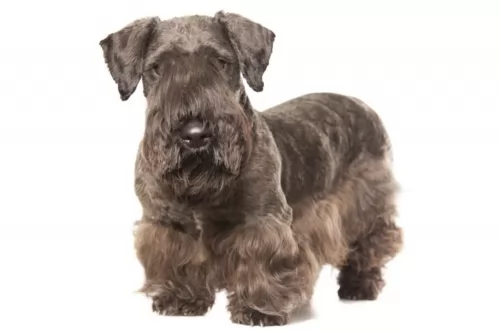 Known as the Bohemian Terrier and looking similar to a Scottish Terrier dog, the Cesky Terrier is a dog breed that has been created by Frantisek Horak, in the Czech Republic.
Known as the Bohemian Terrier and looking similar to a Scottish Terrier dog, the Cesky Terrier is a dog breed that has been created by Frantisek Horak, in the Czech Republic.
Horak wanted to breed a type of hunting dog, and in 1949, using both the Scottish Terrier ad the Sealyham Terrier, he bred the two, creating a new breed that would hopefully be a stronger hunting dog.
The Cesky Terrier was shown for the first time in 1959 and was recognized by the Federation Cynologique Internationale in 1963 and in 1993 by the United Kennel Club. It’s a rare dog this, and is the national dog of the Czech Republic.
 The Borzoi’s silky coat is longer with the male dogs than with the females. The height of these tall graceful dogs is 68 to 74cm. You’ll find that the Borzoi’s back is quite bony and it rises in a curve. He has a tall, lean body and a long, narrow head to match with small, thin ears which rest backwards towards the neck.The silky coat comes in a number of colors - tan, white, black or a mix such as sandy and white or tan and white. The coat is often wavy or slightly curly. The soft undercoat becomes thick in the Winter and he sheds this hair in hotter weather. You’ll find the coat frills on the neck and there is feathering on the hindquarters and with the long tail.
The Borzoi’s silky coat is longer with the male dogs than with the females. The height of these tall graceful dogs is 68 to 74cm. You’ll find that the Borzoi’s back is quite bony and it rises in a curve. He has a tall, lean body and a long, narrow head to match with small, thin ears which rest backwards towards the neck.The silky coat comes in a number of colors - tan, white, black or a mix such as sandy and white or tan and white. The coat is often wavy or slightly curly. The soft undercoat becomes thick in the Winter and he sheds this hair in hotter weather. You’ll find the coat frills on the neck and there is feathering on the hindquarters and with the long tail.
The Borzoi is a gentle, sweet dog, to such an extent that they don’t make good watch-dogs. He is good with other pets and children, although he isn’t the kind of dog to indulge in games with children. He doesn’t bark much and he is also not a high-energy dog, being fairly happy to make himself at home indoors. This is a faithful, loyal and courageous dog.
His temperament is quiet, sensitive, intelligent and somewhat aloof. Even though he has these quiet characteristics, he will still need training and socialization as this just rounds your dog off, making him a pleasure to have around.
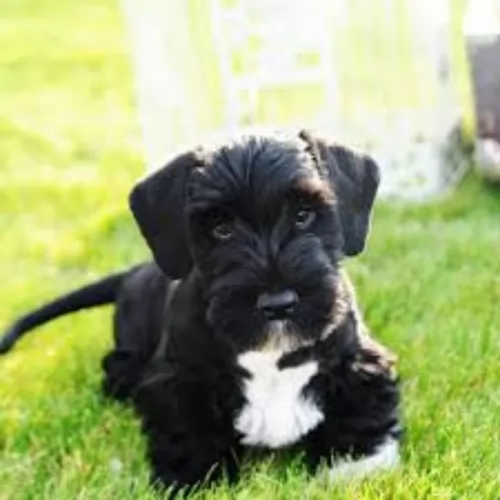 The Cesky Terrer is a longish dog, much like the Scottie and he also has short legs. He is roughly 29ck in height at the withers, is about 43cm in length and weighs anything from 5 to 10kg.
The Cesky Terrer is a longish dog, much like the Scottie and he also has short legs. He is roughly 29ck in height at the withers, is about 43cm in length and weighs anything from 5 to 10kg.
The coat of this dog is long, silky and quite wavy and can be in a number of different shades of gray or a light brown color. Puppies are born black. The soft coat can be kept groomed by clippers or you can take him to have his coat professionally trimmed.
This dog breed has natural drop ears, unlike the Scottie which has erect ears. The tail length is 18-20 cm and low set.
A loyal, quiet and loving family dog, the Cesky Terrier will get on well with children in the home and he is also friendly with other dogs. Just like with any other dog, it will be important to socialize the dog breed at an early age as then he becomes obedient, smart and relaxed. He is a breed which is also easy to train. He also makes a good watchdog.
 If you’re looking for a quiet, amicable, elegant breed, you’ll love the big Russian Borzoi, known for his gentleness, sweetness and gracefulness. He is a friendly dog with his human family, although not too keen on children with their boisterous games. It is his gentleness however, that has endeared him to so many dog lovers.
If you’re looking for a quiet, amicable, elegant breed, you’ll love the big Russian Borzoi, known for his gentleness, sweetness and gracefulness. He is a friendly dog with his human family, although not too keen on children with their boisterous games. It is his gentleness however, that has endeared him to so many dog lovers.
Even though he isn’t one of the most active dogs, he will still need exercise and a walk as he is a big dog used to wide, open spaces. He’ll need the opportunity every now and then to simply run.
He makes a wonderful pet for new- or seasoned pet owners, and if you’re looking for a quiet, devoted companion, why not welcome an elegant, graceful Borzoi into your home?
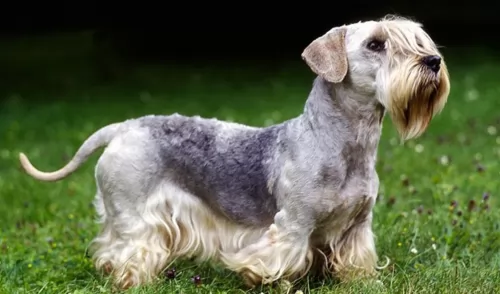 The Cesky Terrier isn’t a small-dog yapper and he will adapt to life in the city or the country. He is a small dog, but he is feisty and sporty and will willingly join you with your jogging or when you go on a walk.
The Cesky Terrier isn’t a small-dog yapper and he will adapt to life in the city or the country. He is a small dog, but he is feisty and sporty and will willingly join you with your jogging or when you go on a walk.
He is intelligent and playful and when you add in characteristics such as being courageous, loving, loyal and feisty, you can see that the Cesky Terrier is guaranteed to make a super family pet.
 The Borzoi is a healthy dog, and you’re not likely to be taking him to the veterinarian often but you do need to know about illnesses which are more prevalent in these large breed dogs.
The Borzoi is a healthy dog, and you’re not likely to be taking him to the veterinarian often but you do need to know about illnesses which are more prevalent in these large breed dogs.
This is a common bone tumor found in dogs and it is more commonly found in large breeds. It can spread quickly to other parts of the body, and although there are treatments, the long term prognosis isn’t good. Your dog will have pain and swelling.
Lymphosarcoma is a common cancer diagnosed in dogs. It is a cancer of lymphocytes and the average dog gets it from 6 years on. Some dogs may not necessarily feel sick, while others are tired, they don’t eat, they lose weight and may have diarrhea.
This is a disease that can be deadly for your dog. Known as gastric dilatation, the stomach twists and fills with gas, putting pressure on the diaphragm, and creating breathing problems. Bloat is more common in large breeds and its up to you as a responsible dog owner to watch out for a swollen stomach with drooling and attempts to vomit.
Remember that some health problems are inherited, but there are other health problems that can be prevented by the way you treat- and raise your dog.
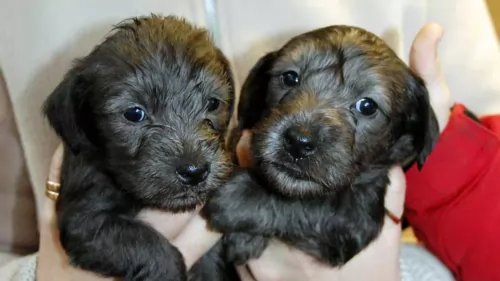 The Cesky Terrier is generally a healthy dog, but this breed sometimes suffers from common dog ailments that other breeds also have to contend with.
The Cesky Terrier is generally a healthy dog, but this breed sometimes suffers from common dog ailments that other breeds also have to contend with.
Eye disorders, ear infections, pancreatitis, hip dysplasia and weight gain are just some health issues you might need to be aware of.
Remember that if you want to promote a healthier dog, feeding him a quality diet and taking him immediately to the vet when you suspect a problem can keep him free from common dog illnesses.
Pancreatitis for instances develops when the pancreas becomes inflamed, and this can be brought on by allowing your pet to become obese. There are other reasons for pancreatitis too such as infection. You will see diarrhea, fever and vomiting with your pet as well as discomfort from abdominal pain. It’s a disease which affects smaller dogs more often than larger breeds.
 Long coated dogs shed, and the Borzoi female sheds after her season and the males shed annually. Once the female is spayed, she sheds like the males. You will need to be brushing your Borzoi every day to rid the dogs of this loose hair.
Long coated dogs shed, and the Borzoi female sheds after her season and the males shed annually. Once the female is spayed, she sheds like the males. You will need to be brushing your Borzoi every day to rid the dogs of this loose hair.
Borzoi teeth collect tartar, more so than with other breeds, so their teeth will need to be brushed at least 3 times a week with special dog toothbrushes and toothpaste to prevent gum and tooth problems.
Good quality food is the foundation for good health with your pet. Home-made food is always good for your dog and should include meat, rice and vegetables. Apart from top quality commercially manufactured food for large breed dogs and recommended by your vet, make sure to include some raw meat into your Borzoi’s diet too. This is imperative to stave off ill health and skin problems. Make sure he has a constant supply of fresh, cool water available to him.
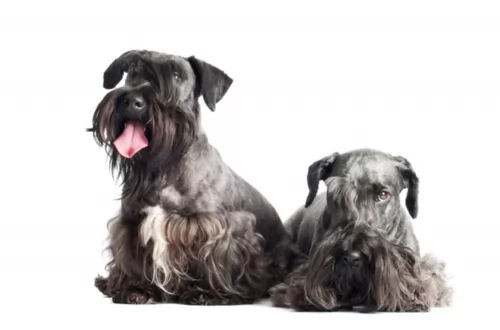 Cesky Terriers may well be a little bit less active and quieter than other terriers, but they will still need a good dose of exercise. He loves to dig, and if he is bored and doesn’t have a plenty of exercise and games, he will want to dig more and cause the owner a lot of frustration. Take him for daily walks and give him some ball games in the garden.
Cesky Terriers may well be a little bit less active and quieter than other terriers, but they will still need a good dose of exercise. He loves to dig, and if he is bored and doesn’t have a plenty of exercise and games, he will want to dig more and cause the owner a lot of frustration. Take him for daily walks and give him some ball games in the garden.
Cesky Terriers will need brushing down at least twice a week and their coats will need to be trimmed into shape every 8 to 10 weeks or so. You’ll also need to check excess hair inside the ears.
As with any dog breed, you will need to check on his nails so that they don’t grow too long and also brush his teeth 2 or 3 times a week to avoid dental disease.